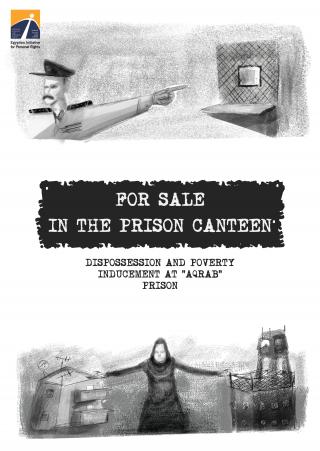The campaign also seeks to destigmatize menstruation and present sanitary products as a basic bodily/health need for women.
Files: Prisons and detention facilities
Report Summary
Whether in “Aqrab” or Tora Farm, Qanater or Minya prison, there is a need to investigate and address the deepening marketization of prison life: how prisoners’ most basic needs—those that the prison authorities are required to provide by law—are instead sold at exorbitant prices for the sake of the canteen’s profit. The move towards the prison-for-profit mode, by providing prisoners’ basic needs for sale in Egyptian prisons, is the thematic umbrella of this research.
Over the past few years, prison authorities in Egypt has been increasingly selling prisoners’ most basic needs—those that the prison authorities are required to provide by law—at exorbitant prices for the sake of the prisons’ canteen’s profit.
EIPR recommends that all places of detention regulated by the Egyptian Prison authorities guarantee sentenced prisoners’ bimonthly and pretrial detainees weekly right to 60 minute visits—without a glass barrier or any other additional constraints.
The undersigned organizations condemn the use of the Aqrab facility as a place to hold and abuse its inmates, as the prison is known to be a site of collective punishment. Although it was established as a prison for dangerous offenders, numerous people detained in connection with political cases are held in the prison, and it is notorious for its systematic violation of prisoners’ rights and inhumane conditions.
The Egyptian Initiative for Personal Rights (EIPR) calls for the immediate release of Ola Qardawi and her husband Hossam Khalaf and the disclosure of the charges their arrest was premised on.
The undersigned human rights organizations and political parties express their deep concern about the Egyptian authorities' intention to start investigations with the two judges Assem Abd al-Gabbar and Hesham Raouf, for allegedly engaging in polit
The Aqrab Prison has become the site of systematic violations that make it the worst prison in Egypt. Violations include medical neglect, excessive disciplinary penalties such as long-term solitary confinement, and the denial of family visits.
“Detention Without End,” a report that highlights the at least 1,464 people held in Egyptian prisons pending trial for periods that have exceeded the legal limit . Article 143 of the Code of Criminal Procedure sets a ceiling on pretrial detention of 18 months to 2 years in criminal cases.
The undersigned organizations are gravely concerned for the health and physical safety of Dr.




